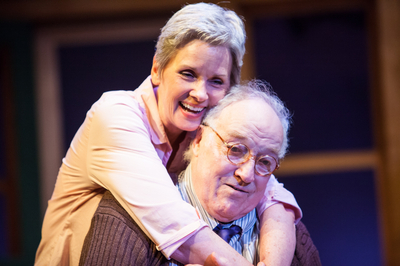Purple Rose Theatre's 'On Golden Pond' could use more waves

Jan Radcliff and John Peakes in "On Golden Pond."
photo by Sean Carter Photography | Courtesy of the Purple Rose Theatre Co.
For this is precisely what happens when 42-year-old Chelsea (Rhiannon Ragland) visits her parents’ summer home in Maine, with a new boyfriend (Tom Whalen) and his 13-year-old son (Milo Tucker-Meyer) in tow. Though Chelsea has a relatively positive relationship with her mother Ethel (Jan Radcliffe), she’s long struggled to connect with, and talk to, her prickly father, Norman (John Peakes). But as Norman nears 80, and his health and memory deteriorate, Chelsea realizes she needs to do whatever she can to bridge the gap between them.
“Pond” deliberately takes its sweet time getting started, with Norman alone on stage, calling the operator and chatting with her about testing the phone. The opening serves at least two purposes: to convey immediately that Norman’s mental sharpness is waning (he forgets that he called the operator, not vice versa); and to get the audience to downshift, in terms of our frenzied sense of time, and get acclimated to an aging couple’s slower pace of life at a summer home.
The problem is, the two-hours-plus play’s slowness ultimately feels like sluggishness, since there’s little suspense or narrative momentum pulling the audience along. (Plus, on opening night, a roughly executed scene between Norman, Ethel and Charlie, the mailman, didn’t help matters.) The 1979 show may also, in some ways, just not have aged well. For instance, in our current economic climate, watching an elderly couple that's well off enough to have and enjoy a summer home - well, things may not be perfect for Ethel and Norman, but they don't seem all that bad, either.
Yes, there are voiced allusions to Chelsea’s painful childhood, but because it doesn’t sound all that severe - and because we just don’t see her interacting with Norman much beforehand - her angry outburst in act two feels sudden, shrill and hollow.
This disconnect is exacerbated in director Michelle Mountain’s production in the way Norman is portrayed. Per Thompson’s script, Norman is a sometimes doddering, sometimes sharp-tongued cynic who both obsesses about death and looks for jobs in the classified. Peakes exhibits great comic timing and delivery in the role, and his meticulous attention to detail makes him the central attraction.
Yet at the same time, Peakes’ version of Norman doesn’t exactly jibe with what other characters say about him. For we hear them talk about how intimidating and harsh and critical Norman can be; and while some softening in old age would likely occur, there seemed little to no evidence of these nasty qualities in Peakes’ Norman. He seemed, if anything, a gruff pussycat - thus making you question the validity of Chelsea’s pain.
In addition, Thompson’s dialogue has a sitcom vibe at times, particularly where 13-year-old Billy is involved. He just doesn’t talk or act like a real kid (not to mention that some of his slang hasn’t aged particularly well), being preternaturally mature in some ways. And predictably, Thompson goes for the “old guy using young people’s slang” jokes that are always easy pickings.
Even so, as is usually true in a Rose production, there’s top-notch talent both on stage and behind the scenes. Overall, the entire cast is polished and appealing, with two of my favorite performances coming from minor characters: Whalen as Chelsea’s dentist boyfriend, who cagily spars with Norman about a touchy subject; and David Daoust, who wields a Maine accent like a tailored suit while playing the mailman, Charlie - Chelsea’s childhood boyfriend.
In terms of design, the production looks great. Danna Segrest’s skilled properties design makes the scene in which Ethel prepares the house for the summer feel genuine, as do smaller details, like the pictures and decorations on the walls, and the books and games on the shelves. Bartley H. Bauer’s set design provides a nice sense of depth (check out the sink in the kitchen area that’s visible through a doorway) and rustic charm. Costume designer Christianne Myers gives the audience a visual sense of era and character. And finally, Reid Johnson’s lovely, textured lighting design imitates nature (the reflection of the water), communicates a sense of warmth and nostalgia, and guides our eyes with care.
Despite these strengths, and several moments of humor and charm, I never felt fully swept up and invested in the play. In one crucial moment, Norman tells Chelsea, “I just thought we didn’t like each other very much” - a heartbreaking thing to hear a father say to his daughter, and clearly what Thompson aims to explore with “Pond.” Yet due to shortcomings in the script, the confession feels unearned, and thus only hints at the play’s best potential.
"On Golden Pond" continues through Sept. 1. More information here.
Jenn McKee is the entertainment digital journalist for AnnArbor.com. Reach her at jennmckee@annarbor.com or 734-623-2546, and follow her on Twitter @jennmckee.

